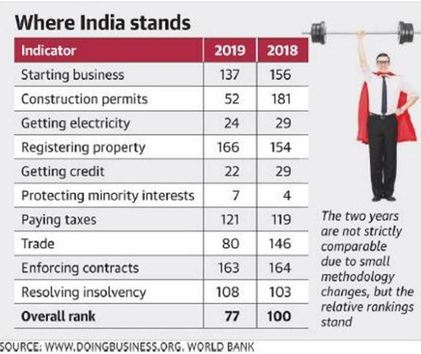ForumIAS announcing GS Foundation Program for UPSC CSE 2025-26 from 19 April. Click Here for more information.
ForumIAS Answer Writing Focus Group (AWFG) for Mains 2024 commencing from 24th June 2024. The Entrance Test for the program will be held on 28th April 2024 at 9 AM. To know more about the program visit: https://forumias.com/blog/awfg2024
Opinion | Lessons from the World Bank on ease of doing business
Article:
In the backdrop of World Bank’s Ease of Doing Business Index, the article discusses the India’s improvements and challenges in ease of doing business
Important Analysis
India’s position
- India has been one of the biggest ‘improvers’ in the 2019 Ease of Doing Business Index and has moved from 100thto 77th position in 2019 rankings
- As per World Bank, India is an easier place to do business in compared to BRICS countries such as Brazil (109) and South Africa (82) and West Asian economies such as Qatar (83) and Saudi Arabia (92).
- However, India is still way behind than countries like China (46, the Hong Kong Special Administrative Region is at 4), the U.S. (8), Singapore (2) and New Zealand (1)
Improvements
- Securing construction permits
- The World Bank found that major cities in India drastically reduced the number of days they took to give out construction permits, from 144 days last year to 95 days. Consequently, costs declined from 23% of the building value to just 5%.
- Single-window clearance for securing building permits in Delhi and a new online system in Mumbai, brought about the major change
- Trading across the borders: India’s rank in cross-border trade improved from 146 to 80. Major contributing factors to this improvement were upgrades in port infrastructure, a move to online documentation and facilities for exporters to seal their containers on their own
- India made significant improvement on the indicator getting credit. India has strengthened access to credit by amending insolvency law. Secured creditors are given absolute priority over other claims.
- India also made improvements in indicators like starting a business
Challenges:
- Registering Property: India ranked poor on registering property and ranked 166. It takes 69 days to register a property and costs about 8% of its value in India. However, it just takes 20 days and at half that cost in OECD countries
- Paying taxes: Despite introduction of GST, India performed poorly on paying taxes and ranked 121.
- Enforcing contracts: India ranked 163. Enforcing a claim through the courts in Mumbai takes 1,445 days and costs 31% of claim value. However, in OECD countries the process takes 582 days at a cost of 21%.
About Ease of Doing Business Study:
- The study aims at capturing the experience of small and mid-sized companies in a country with their regulators, by measuring the time, costs and red tape they deal with.
- Indicators used: Starting a business, getting construction permits, securing electricity, registering property, getting credit, protecting minority investors, paying taxes, cross-border trade, enforcing contracts and resolving insolvency.
- To collect data, it empanels experts from the largest business cities who can capture the experience of multiple businesses.
- Each country is then assigned a rank out of 190 countries based on the total score it earns on 10 key indicators
Shortcomings of Ease of Doing Business Study:
- It measures a country’s progress on basis of few indicators in great depth, without trying to be comprehensive about the indicators. Further, the sample size is not statistically large
- The spatial coverage of the study is limited as it covers only two cities (Delhi and Mumbai in case of India).
- It does not assess macroeconomic stability which is determined by factors like development of the financial system, quality of the labour force, incidence of bribery and corruption, market size and lack of security.
- The scope of the study is limited as it excludes the informal sector.
- In case of India, the study may not reflect the experience of partnership or proprietorship firms that dominate the small business space, or those located in Tier 2 or Tier3 towns.
- The criteria used for determining Standardised business entity automatically disqualifies a large number of Indian start-ups and enterprises
- The study does not include indirect (value-added) taxes like the GST in the measurement of the tax burden, on the grounds that they are collected and transmitted, and do not enter into the income statement.





